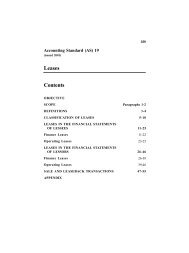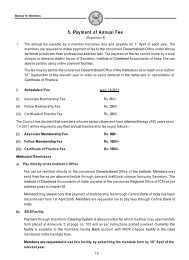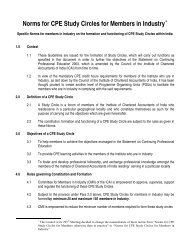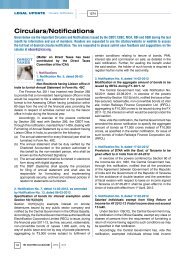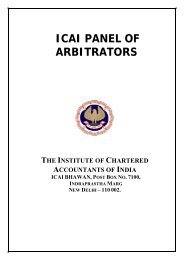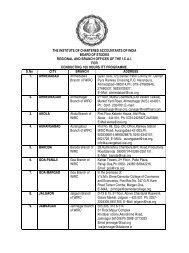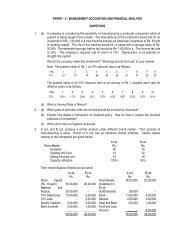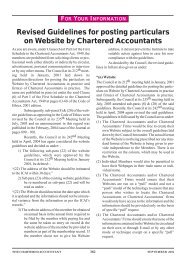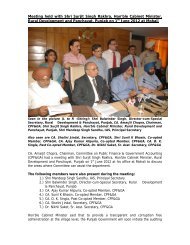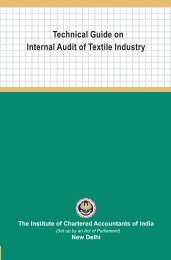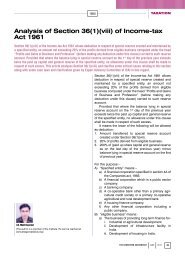The Chartered Accountant
The Chartered Accountant
The Chartered Accountant
Create successful ePaper yourself
Turn your PDF publications into a flip-book with our unique Google optimized e-Paper software.
DECEMBER 2008 986 THE CHARTERED ACCOUNTANT<br />
TAXATION<br />
<strong>The</strong> Central Government acting under the authority of Law (Section 90) has<br />
entered into DTAAs with more than 60 countries. Such treaties serve the<br />
purpose of providing protection to the tax payers from double taxation. As<br />
per section 90(2), in relation to an assessee to whom any DTAA applies, the<br />
provisions of the Act shall apply only to the extent they are more beneficial to<br />
the assessee. <strong>The</strong> provisions of these DTAAs thus prevail over the statutory<br />
provisions.<br />
of leaving India is hardly material or relevant. For all<br />
these reasons, ‘M’ is not a resident in India for the<br />
financial year 2005-06.<br />
Thus, salary income received in India by ‘M’ from Indian<br />
company for rendering services outside India is<br />
not taxable in India.<br />
Non-Resident<br />
A person who is not a resident in terms of the above<br />
provision is a non-resident.<br />
‘Person resident outside India’ means ‘person not<br />
resident in India’ - ‘A person resident outside India’<br />
would have to be understood as a person who was<br />
not a resident in India. Where a person is resident in<br />
India in view of provisions of section 2(p)(iii)(c) and<br />
section 2(q) of FERA, he is not entitled to exemption<br />
under section 10(4A) - CIT v. K. Ramullan [1997] 92<br />
Taxman 122/226 ITR 264 (Ker).<br />
Resident but Not ordinarily Resident<br />
(RNoR)<br />
A person who is otherwise resident would be<br />
RNOR if he satisfies any of the following two<br />
conditions<br />
l He has not been resident in India in 9 out of<br />
10 preceding previous years.<br />
or<br />
l He has not been in India for an aggregate period<br />
of 730 days or more in the preceding seven<br />
previous years. W.e.f. 1.4.2004, the status<br />
‘RNOR’ has been redefined as follows:- An<br />
individual shall be said to be RNOR if he has<br />
been a non-resident in India in 9 out of 10<br />
previous years preceding or period amounting<br />
to 729 days or less during the seven previous<br />
years preceding that year.<br />
Scope of Taxation<br />
Based on the residential status of payer, his tax liability<br />
will be as follows:<br />
Residential Status Taxability of Income<br />
Resident All income of the previous year<br />
wherever accruing or arising or<br />
received by him including incomes<br />
deemed to have accrued<br />
or arisen<br />
Non-Resident All income accruing, arising to<br />
or deemed to have accrued or<br />
arisen or received in India<br />
Resident but not<br />
ordinary Resident<br />
All Income accruing or arising<br />
or deemed to have accrued<br />
or arisen or received in India.<br />
Moreover, all income earned<br />
outside India will also be included<br />
if the same is derived<br />
from a business or profession<br />
controlled or set up in India.<br />
Expatriates Working in india<br />
In case of foreign expatriate working in India, the<br />
remuneration received by him, assessable under the<br />
head ‘Salaries’, is deemed to be earned in India if it is<br />
payable to him for service rendered in India as provided<br />
in section 9(1)(ii) of the Income-tax Act, 1961.<br />
<strong>The</strong> Explanation to the aforesaid law clarifies that<br />
income in the nature of salaries payable for services<br />
rendered in India shall be regarded as income earned<br />
in India. Further, from assessment year 2000-01 onwards<br />
income payable for the leave period which is<br />
preceded and succeeded by services rendered in India<br />
and forms part of the service contract shall also be<br />
regarded as income earned in India. Thus, irrespective<br />
of the residential status of the expatriate employee,<br />
the amount received by him as salary for services<br />
rendered in India shall be liable to tax in India being<br />
income accruing or arising in India, regardless of<br />
the place where the salary is actually received. However,<br />
there are certain exceptions to the rule which are<br />
briefly discussed on next page:



